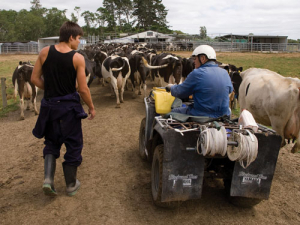DairyNZ Levy Vote Underway as Chair Highlights Seven-Fold Return
Voting has started for the renewal of DairyNZ's milksolids levy.
 Farmers who invest in their businesses to attract and retain the right people benefit from lower staff turnover.
Farmers who invest in their businesses to attract and retain the right people benefit from lower staff turnover.
Getting good staff is just one of the challenges faced by dairy farming businesses. But are we doing enough as employers to create environments where good people want to work?
DairyNZ’s people team leader Jane Muir says to compete with other industries for great staff, we must make it a priority to offer world-class work environments on our farms.
Farmers who invest in their businesses to attract and retain the right people benefit from lower staff turnover. In turn, this reduces recruitment costs, stress and downtime while new staff get up-to-speed with their role.
Also, when you provide good leadership for your people – looking after, rewarding and supporting them – they’ll do their jobs well and act on opportunities that benefit your business. That could mean they wash down efficiently to save water, manage pasture to maximise feed, or implement an improved irrigation model.
Moving from good to great
Recognising the key role people play in successful and resilient dairy farm businesses, Federated Farmers and DairyNZ launched the Sustainable Dairying: Workplace Action Plan in October 2015. This supports farmers with tips, tools and resources to go from being good employers to great employers. It also sets out guidelines, expectations and aspirational targets under five pillars of good people management:
• balanced and productive work time
• fair and competitive remuneration
• wellness, wellbeing, health and safety
• effective team culture
• rewarding careers.
As world-class milk producers, we should be aiming to provide a safe, rewarding and productive workplace, with a motivated team that’s working towards achieving shared business goals.
If each of us achieved that, we’d have no problems getting good staff. Wouldn’t that be something that made our lives easier and be worth celebrating in 2018?
Become a friend of the Workplace Action Plan
Sign up and you’ll be among the first to hear about new initiatives and resources, and how we’re progressing against targets. Visit dairynz.co.nz/wap.
Support for employees
DairyNZ has online resources for farm employees. The resources cover practical skills and tips such as preparing a CV, finding the right job and preparing for interviews. They also offer useful information including what to expect as an employee on a New Zealand dairy farm, rights and entitlements, how to progress, setting goals and training. Visit dairynz.co.nz/employee.
Quick and easy farm rosters
Over 2000 farmers have signed up to DairyNZ’s online Roster Builder since its release in 2015. It lets you set up a simple roster in under five minutes and, with a bit more time invested, it becomes a powerful business tool for exploring different roster options and cost implications.
For more info and to sign up, visit dairynz.co.nz/rosters.
*Look out for this article and other interesting on-farm management stories in Getting the Basics Right 2018 issue arriving in your mail boxes soon.
Former Fonterra executive Alex Turnbull has been appointed CEO to lead all five Yili Oceania Business Division companies in New Zealand.
Fonterra executive René Dedoncker is leaving the co-operative later this year to lead Australian agribusiness Elders.
Alliance Group and the Southland Stags rugby team have joined forces in a partnership that will see the the meat co-operative's farmgate brand feature on players' team kits and replica jerseys.
Fonterra's plan to expand its organic programme to the South Island is being well received by farmers, the co-op says.
Voting has started for the renewal of DairyNZ's milksolids levy.
The most successful catchment groups in NZ are those that have 'a source to sea' approach.
OPINION: A dairy version of fantasy football has been launched.
OPINION: In recent weeks beaches in Auckland, Wellington and Christchurch have been unsafe to swim in because of recent heavy…